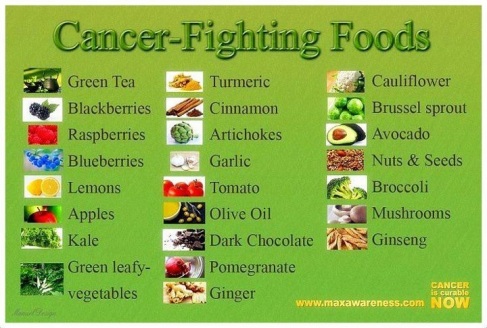The following is an article written by James Mechino, which I wanted to share to my patients. The information is solid and extremely helpful. Enjoy.
Everyone knows about the dreaded C word, and far too many have direct experience with it in one way or another. A diagnosis of cancer alone can send shock waves through the entire family, office or even a community. And with cancer risk factors (carcinogenic foods, environmental hazards, sedentary lifestyles) on the rise, there’s no better time to learn about a simple, painless step you can take to reduce your risk of developing cancer, or do your best to fight it if you’ve already been diagnosed. Yes, it’s the power of nutrition – nature’s best cancer defense.
If you haven’t already heard about the book Foods That Fight Cancer: Preventing Cancer Through Diet, I strongly suggest you pick up a copy and recommend it to everyone you know. The book is authored by two leading cancer researchers, Drs. Richard Beliveau and Denis Gringas. Dr. Beliveau holds the chair in the Preventation and Treatment of Cancer at the University of Quebec in Montreal, Canada, and Dr. Gringas is a researcher in the Molecular Medicine Laboratory of UQAM-Sainte-Justine Hospital and the University of Quebec at Montreal. Here’s some of what they say about how food can fight cancer.
How Food Fights Cancer
As stated in their book, “Nature supplies us with an abundance of foods rich in molecules with powerful anti-cancer properties, capable of engaging with the disease (cancer) without causing any harmful side effects, In many respects, these foods possess therapeutic properties on par with those of synthetic drugs.” In a very precise but understandable manner, the two researchers outline the many biological targets affected by bioactive nutrients in foods that can help prevent cancer and be used in the adjunctive management of cancer. More specifically, they highlight the research showing how specific food-borne bioactive molecules can accomplish the following:
- Decreased free-readical damage to DNA, which is known to produce cancerous mutations:
- Strengthen immune system function, as various immune cells are known to destroy cancer cells ( e.g., macrophages and killer-T cells);
- Inhibit angiogenesis (growth of new blood vessels) of developing tumors;
- Block key signal transduction pathways required for cancer cell replication;
- Stimulate pathways that induce programmed cell death (known as apoptosis of existing and emerging cancer cells;
- Enhance detoxification, helping to neutralize and eliminate carcinogens in the body;
- Promote cellular differentiation, which decreases the risk that healthy cells will become cancer cells;
- Block the formation of nitrosamines (chemical compounds, some of which can cause cancer) in the body;
- Block the synthesis of dangerous forms of estrogen and testosterone, which are associated with reproductive organ cancers;
- Slow the rate of cell replication, which is a key factor in reducing the frequency of genetic mutations that may occur:
- Blocking receptor sites on cells to prevent overstimulation of hormones and growth factors, which, in turn slows down the rate of cell division; and
- Reduce the synthesis of inflammatory prostaglandin, hormone-like chemical messengers, which are also linked to increased cancer risk.
Key Cancer-Fighting Foods
The following list is a list of cancer fighting foods, which for the best cancer-fighting effects can be blended together into a cocktail.
*Cabbage *Blueberries
*Brussel Sprouts *Broccoli
*Garlic *Scallions
*Tumeric *Black pepper
*Cranberries *Grapefruit
Green tea *Grapes
The implication is that individuals who have cancer may wish to use a daily cocktail of this nature in conjunction with their standard medical treatment, as a means to enhance certain biological mechanisms that may help their body fight the disease.
Anti-Cancer Foods for Daily Use
For the rest of us, Drs. Beliveau and Gringas suggest there is a daily preventative threshold level of cancer-fighting foods that each of us should strive to attain. Their suggestions for the prevention of cancer include consumption of the following items each day:
- Brussel sprouts – 1/2 cup
- Broccoli, cauliflower, cabbage – 1/2 cup
- Garlic – 2 cloves
- Onions, shallots – /2 cup
- Spinach, watercress – 1/2 cup
- Soy (edamame, dry roasted beans) – 1/2 cup
- Freshly ground flaxseeds – 1 tablespoon
- Tomato paste – 1 tablespoon
- Tumeric – 1 teaspoon
- Black pepper – 1/2 teaspoon
- Blue berries, raspberries, blackberries – 1/2 cup
- Dried cranberries – 1/2 cup
- Grapes – 1/2 cup
- Dark chocolate – 40 grams
- Citrus juice – 1/2cup
- Green tea – three 250 milliliter servings
- Red wine – 1 glass (5 Ounces)


